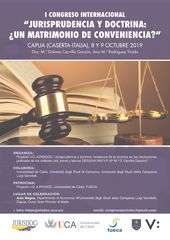I Congreso Internacional “Jurisprudencia y doctrina: ¿Un matrimonio de conveniencia?” Nápoles, 8 Y 9 de octubre 2019 8 October 2019
El próximo mes de octubre tendrá lugar en Nápoles el I Congreso Internacional “Jurisprudencia y doctrina: ¿Un matrimonio de conveniencia?”
Los matriculados podrán presentar comunicaciones sobre la temática general del congreso, de acuerdo con las indicaciones de forma y plazos publicadas en la web. Está prevista la publicación de las ponencias y las comunicaciones seleccionadas por el Comité Científico en una obra colectiva.
El plazo para presentar abstracts estará abierto hasta el 30 de julio de 2019. Consulta aquí las normas de publicación.
Puedes conocer el programa en este díptico. El coste del congreso es de 0 euros para estudiantes de universidades colaboradoras, y de 60 euros para comunicantes, profesorado e investigadores.



